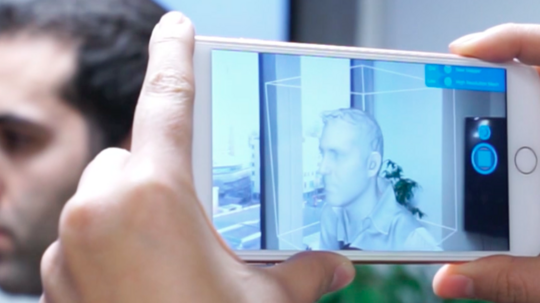
Want a free pair of custom-made sunglasses from Skelmet? We are giving away a pair through a giveaway in our BostInno Beat newsletter on Thursday, March 2. To learn how to win, sign up for the newsletter before Thursday at 2 p.m.
The relationship between athletics and science is one of the more sexier trends in the wonderful world of tech innovation. I’m talking about those wristbands that monitor the number of calories burned, sleeves that track stress levels and clips that measure your vertical jump. The ever-growing market for these products makes it seem like tech developers are getting more comfortable with tracksuits than pantsuits.
However, after talking to one Cambridge startup, I learned that the perceived sexiness of some wearables fits only 15 percent of the population. That leaves out most people, especially Asians, who have dramatically different facial structures than those of other races. Not too hot anymore, right?
Enter Skelmet, a Cambridge startup that scans your face to 3-D print you the perfect pair of glasses called the “Falcon I.” Co-founders Rain Wang and James Cao recently launched an Indiegogo campaign that has already exceeded its goal, setting them up to start producing some shades by September 2017.
Wang explained that she spent time competing in triathlons and playing tennis, and she always was on the search for gear that fit. These sunglasses are for endurance athletes who want wrap-around protection.
Here’s how it works, according to Wang:
Skelmet’s patented technology, “3D Fit”, draws from a database of over 3,500 head scans to analyze every parameter of the human face. Using the Skelmet scan app, either your friend or a trained associate will scan your face. Once the 3D scan is uploaded, the 3D Fit algorithms running in the cloud automatically extract 86 key points from the customer's head scan and generate the product model based on the extracted parameters, meaning that every detail of the sunglasses is custom fitted - down to every last curve.
While the technology handles the modeling and details, Wang said that they’re still refining the 3D Fit algorithms with machine learning based on customer feedback because “comfort is a very objective thing.”
“We can’t design until we describe the anatomy,” she added.
Wang, who has spent time as both a physicist and architect, was excited to have this challenge. She described the face-scanning app itself, aimed at smartphone users, as a“piggy-back” from technology developed by Harvard, MIT and other Boston partners. As augmented reality and virtual reality become more of a dominant research focus, she said finding people to help was simple.
“We saw the trend, we saw the potential and we worked to combine all these different fields and technologies and disciplines to come up with something like [Falcon I],” she said.
Because Skelmet clearly doesn’t lack a flair for innovation, I wondered if the Falcon I could become a competitor with other smart wearables.
“That’s part of the plan, once we get the fit down,” she said. “You can’t do everything at once, and I can’t promise everything at the same time. First, we’ll do mass customization because we want to do it right. Then, adding those functions wouldn’t be hard at all.”
"Products shouldn’t have a negative impact on self-confidence."
So for now, the product is geared toward athletes who rely on fit while training or competing. From a broader, more emotional perspective, however, the target customer is just someone who doesn’t fit in.
“Every single customer I interviewed said the same thing. ‘I have a wider nose, I have a tiny head, my ears are not even.’ And that was just because traditional products don’t fit them,” Wang told me. “It makes me kind of sad, because you don’t look weird. No one looks weird, no one is abnormal... products shouldn’t have a negative impact on self-confidence. They should fit.”
(Side note, Wang said that this whole idea was conceived after her co-founder came across unrealistic ancient Greek helmets at The Met. I’m just going to leave that here for you to think about, BostInno readers.)








